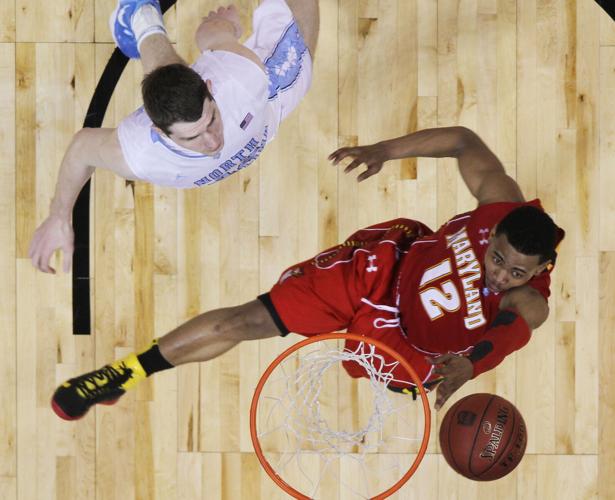Basketball has taken Terrell Stoglin around the world. Literally.
Since the Tucson native and former Santa Rita High School combo guard abruptly declared for the NBA draft in 2012, after he was suspended for a year by the University of Maryland for a violation of student-athlete code of conduct, Stoglin has played in Greece, France, Ukraine, Poland, Italy, Lebanon, Turkey, Qatar, Bahrain, Venezuela, Egypt and Saudi Arabia.
Most recently, Stoglin, who was among the leading scorers in college basketball during the 2011-12 season, has taken his talents to the Basketball Africa League (BAL), which was formed by the NBA and FIBA in efforts to expand the game globally.
Stoglin is the BAL’s back-to-back scoring champion, averaging just over 30 points per game in two seasons with Association Sportive Salé in Morocco. Now, Stoglin is preparing for his first season with AS Douanes in Senegal.
Stoglin joined “Spears and Ali” on ESPN Tucson recently to talk about playing in Africa, traveling the world and why he chose Maryland over the hometown Arizona Wildcats in 2010.
How has it been playing for the BAL?
A: “It’s been a learning experience more than anything, just learning about my history and stuff like that, and just being around the people feels like a homecoming and I feel welcomed there. It’s very warm there as far as love, so being out there has been a great experience spirit-wise.
“Basketball-wise, it’s been fun playing against great talent. There’s a lot of hidden talent in Africa and a lot of hungry guys. It’s been fun to play against them and compete — it reminds me of the old days, playing on ESPN and stuff like that.
“The continent itself, it’s my roots and where I came from, my beliefs and things like that. I’ve learned a lot about the Bible, a lot about Yahweh, so it was great for my spirit. ... It became home for me.”
What have you noticed about the growth of basketball in Africa?
A: “To be completely honest, it’s just better basketball. There’s less politics, and there’s always politics in this business, I’ll be the first to speak out on that. This is an entertainment industry, so there’s always politics. However, over here, it’s less politics and just all about basketball. You might be a star, but you’re not going to get that call (from a referee), so you have to hit the weight room and continue to work on your craft. You don’t get superstar calls or All-Star calls.
“The guys look up to you, they want to compete against you, and they want to prove themselves against you. And it’s Africa, so you’re playing against warriors. These are guys who are coming from places where there are civil wars and they’re forced at 10 years old to fight, so imagine how fierce they are on the basketball court. I’m a warrior, so I’ve enjoyed being able to dominate the last two years against (them).”

Santa Rita High School product Terrell Stoglin chose Maryland over Arizona in part because the UA program was in the midst of a transition phase at that time.
A few years ago, you were playing professionally in Venezuela and in the middle of the game, you walked up to a referee, grabbed the ball from his hands, punted it into the crowd and walked off the court flipping off fans. What led to that?
A: “Great question, and I’ll give you a complete and honest answer: It was just a lot of politics. Every country you go to, it’s different. You play in the (U.S.), there’s a lot of politics in college and in the NBA. You go and play professionally (overseas) and think it’s going to be normal? Nah, it’s the same. Other countries put money here, money there, people are betting on games.
“I was in a situation where I wanted to win, and the team I was playing for was literally betting on ourselves to lose. They were doing everything in their power to lose and I’m a competitor, so I don’t like to lose no matter how much money is on the table. I want to win. So, I lost my cool. Because I didn’t leave my family to come out here and lose for you guys. I want to win, so I lost my emotions and I’ve grown from it.”
When did you find out that your team was throwing the game or shaving points?
A: “The owner and the coach basically came up to me and said, ‘We have to lose this game, because we’re being sent a certain amount of money for this stuff.’ But you also have to remember the country you’re playing in. Venezuela is a gangster country. … It’s gangster money, and these are the types of things you have to deal with when you go to other countries, and it’s not easy. That’s why a lot of guys quit early.”
How have the different experiences playing basketball around the world shaped you?
A: “Basketball is a sport. Not only is it , but it’s loved. A lot of people don’t know that there are some countries that love basketball. Places on earth you never thought you’d go to, they love the game of basketball. Fans come out and support it. Kids grow up from 3 years old into a grown adult and have always rooted for this team. It’s like, ‘Wow, you guys have a team here?’ “
Looking back on your college recruitment, why did you choose to play for Maryland over Arizona?
A: “There were a number of things: the tradition at Maryland was very stable, then, if you remember, Lute Olson had left, and there were numerous coaches. Also, Josh Pastner had left, and my connection to the U of A was Josh Pastner; he was with me ever since my freshman year of high school. That was my big brother. Once he went to Memphis, it was like, ‘I gotta figure out something else.’
“The relationship I had with Maryland was one of a kind. They were coming to my house and making sure I was in my math class at Santa Rita. They were showing up, taking flights to Tucson — I didn’t even know they were there — and they were sitting in my math class and making sure I was on time. That was something I’ve never seen before, so I was like, ‘Where’s the paper at?’ When I visited over there, College Park is like no other. The ACC is the best basketball known to mankind.”
Let’s say Olson coached a few more years, do you think you would’ve stayed home to play for the hometown Wildcats?
A: “To be honest with you, I would’ve come to the U of A, because I had a great relationship with Jerryd Bayless, Hassan Adams, Salim Stoudamire. To this day, Loren Woods is my big dog. Those guys are my family. Nic Wise, Jordan Hill, those guys were my big dogs. When I was at Santa Rita, I was always kicking it with the big dogs. Those guys are my people, so I definitely would’ve went to the U of A. But the tradition changed.”
<&rule>
LeBron James overtook Kareem Abdul-Jabbar as the player with the most career regular-season points in National Basketball Association history. Yousef Gamal El-Din and Manus Cranny discuss the accomplishment on Bloomberg Television.






